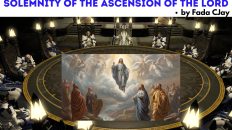Back in those days in Ibadan (around 2008) in Philosophy class (100 level), I vividly remember how our lecturer of “Ancient Philosophy” (Dr. Badru) made efforts in explaining the origin of philosophy in the Western Tradition. He made us realize that some Ionian thinkers (who lived in the ancient Greek world around 600 BC) were preoccupied with the basic makeup of things (primary stuff) and the nature of the world and of reality. The pertinent question at that stage of philosophizing was: “from where does everything come? Of what does it really consist (primary substance)? In this regard, Thales, Anaximander, and Anaximenes developed their ideas about the Universe. While Thales opined that the primary substance was water, Anaximander asserted that it was the “Apeiron” (ἄπειρον) in Greek, which means: Infinite, boundless, unlimited etc., Anaximenes, on the other hand, proposed that the ultimate stuff of the universe was AIR. In the same stream of philosophical ruminations, Heraclitus later came up and averred that FIRE was the primary substance and the source of all there is.
These philosophers had their particular reasons for averring different elements as the ultimate stuff. Thales observed that the nutrition of all things is moist and that heat itself is generated from the moist and is kept alive by it. Perhaps he also got his notion from the fact that the seeds of all things have a moist nature, and that water is the origin of the nature of moist things. Anaximander’s reason for averring the boundless (Apeiron) as the original material of existing things lies in his conviction that the source from which existing things derive their existence is also that to which they return at their destruction, according to necessity. For him, it is neither water nor any other of the so-called elements, but a substance different from them which is infinite, from which arise the sky and the worlds within them. Anaximenes’ reasons for choosing air as the underlying material springs from his conviction that our soul, being air, holds us together, so do breath and air surround the whole world. For Anaximenes, in its thinnest state, air comes to be; being condensed it becomes wind, then cloud, and when still further condensed it becomes water, then earth, then stones, and the rest of things comes to be out of these. Heraclitus later joined the Ionian thinkers and opines Fire. He went on to assign contradictory properties to fire. This could point to some form of the harmony of opposites being his motivation. For him, fire is constantly changing as it rises up to the sky. The flame blazes up and up and never at any moment does it seem constant…and yet we call it the same fire. In fact, if the fire stopped changing in this way, it would die down and stop existing altogether. It is dependent on its change for its existence.
In the light of the antecedence, we have four basic elements to note here: water, the boundless, air, and fire.
Juxtaposing the cognitive ruminations of the ancient philosophers with our Christian belief, we would discover some parallelisms. For example, the book of Genesis opens up with the creation story. It does tell us “In the beginning, God created heaven and earth. Now, the earth was a formless void, there was darkness over the deep, with a Divine Wind sweeping over the waters”. (Gen. 1:1-2 – The New Jerusalem Bible, study edition). From this account, we can readily note “AIR” (divine wind) sweeping over the WATERS.
Dear friends in Christ, the elements (water, the boundless, air, and fire) identified by the pre-Socratic philosophers of Miletus (Ionian thinkers) at various times and manners were used by God to manifest His presence in the Scripture. We are quite conversant with the story of Elijah, calling down fire from heaven (1Kings 18:38); likewise, God led the Israelites through the Red Sea through a pillar of cloud by day and a pillar of fire by night (Exodus 13:21). In addition, from the beginning of the Bible to the end, WATER flows through the pages of Scripture. It is full of passages that link water to Gods creation, blessing, and saving. We have already identified the Divine Wind of Creation hovering across the WATER. Jesus talks of being born again by water and the Holy Spirit: (Jn. 3: 1-8ff) Later he talks of giving us the Living Water which flows from his heart (cf. Jn. 7:37-39). Also, in Revelations 22:17 The Spirit and the bride say, “Come.” Let anyone who hears this say, “Come.” Let anyone who is thirsty come. Let anyone who desires drink freely from the water of life. With regards to the Apeiron (infinite/boundless), the Scriptural pages have not failed to describe God as being infinite and transcendent. This can be understood in terms of His omniscience, omnipotence, omnipresence.
Now, what does this have to do with Pentecost?
This Sunday, Holy Mother Church celebrates the Solemnity of Pentecost – a day in which we commemorate the outpouring of the Holy Spirit upon Mary and the Apostles. The First Reading (ACTS 2:1-11) tells of the Pentecost event – the manifestation of the Holy Spirit in the form of the aforementioned elements (WIND & FIRE). Luke tells the story in Acts… he says: “…And suddenly there came from the sky a noise like a strong driving WIND, and it filled the entire house in which they were. Then there appeared to them tongues as of FIRE, which parted and came to rest on each one of them. And they were all filled with the HOLY SPIRIT and began to speak in different tongues, as the Spirit enabled them to proclaim. The Holy Spirit, here, can be understood as the Divine Catalyst. In the field of Science, a Catalyst is a chemical substance that facilitates or speeds up the rate of a chemical reaction and is itself unchanged during the chemical reaction. Put differently, we can say that a catalyst is capable of initiating a change in another substance, and remains unchanged. In Chemistry, examples include Manganese dioxide, used to decompose Hydrogen peroxide to oxygen and water; also, Tetraoxosulphate VI acid (H2SO4), used to dehydrate Ethanol to Ethylene, etc. A familiar example of a catalyst is heat. HEAT is used to speed up a number of chemical reactions but at the end, it remains unchanged. Similarly, the Holy Spirit came down on them in the form of parted tongues of Fire, and was capable of initiating a change in them, “and they began to speak in different tongues as the Spirit enabled them to proclaim”. Thus, the effective work of the Spirit of God as a Divine Catalyst is clearly seen and understood – the Divine Catalyst was able to create them anew, transforming them into perfect Christians and soldiers of Christ. Little wonder the Psalmist (PS 104, esp. in verse 30), realizing the powerful effects of the Holy Spirit as the Divine Catalyst exclaimed: “Lord, send forth your Spirit, and renew the face of the earth.”
A SPOKEN WORD can also be considered as a catalyst in the sense that it transforms the hearer, but in itself, it remains just a spoken word. Thus, in the Gospel (Jn. 20:19-23), we see Christ making use of his spoken word in diffusing the Holy Spirit (the Divine Catalyst) in his Apostles. That is, Christ gave that same “BREATH OF LIFE” (AIR) as at creation to his Apostles. John says, Jesus breathed on his Apostles saying, “Receive the Holy Spirit” and gave them the power to forgive sins; from that very moment, they were transformed by the Divine Catalyst and recreated anew, enabling them to exercise the divine authority of THE FORGIVENESS OF SINS. Put differently, the divine catalyst was able to transform them into a merciful community (“Whose sins you forgive are forgiven…”) and would aid them to take up the missionary work of Jesus Christ (“As the Father has sent me, so I send you”).
Dearest friends in Christ, the Holy Spirit comes to us as a gift to instruct and transform us into what God wants us to be, but it remains unchanged in itself. In a world of disunity and tension of the opposites, the Divine Catalyst (Holy Spirit) should enable us to foster unity and become instruments of peace, recognizing the talents/gifts in the life of every individual. The Holy Spirit is the best gift of God to humanity. We are called to utilize the many gifts of the Spirit in service, and foster unity. Just as Paul puts it in the Second Reading – his first letter to the Corinthians (1 COR 12:3B-7, 12-13): “There are different kinds of spiritual gifts but the same Spirit; there are different forms of service but the same Lord; there are different workings but the same God who produces all of them in everyone. To each individual, the manifestation of the Spirit is given for some benefit. Therefore, it is apparent that our world today needs the continuing effect of the Divine Catalyst in order to create a just world (utopia) – for it is in Him we live and move and have our being (ACTS 17:28).
May the Divine Catalyst (The Holy Spirit) continually be the inspiration behind all our aspirations and deeds.
SHALOM!




